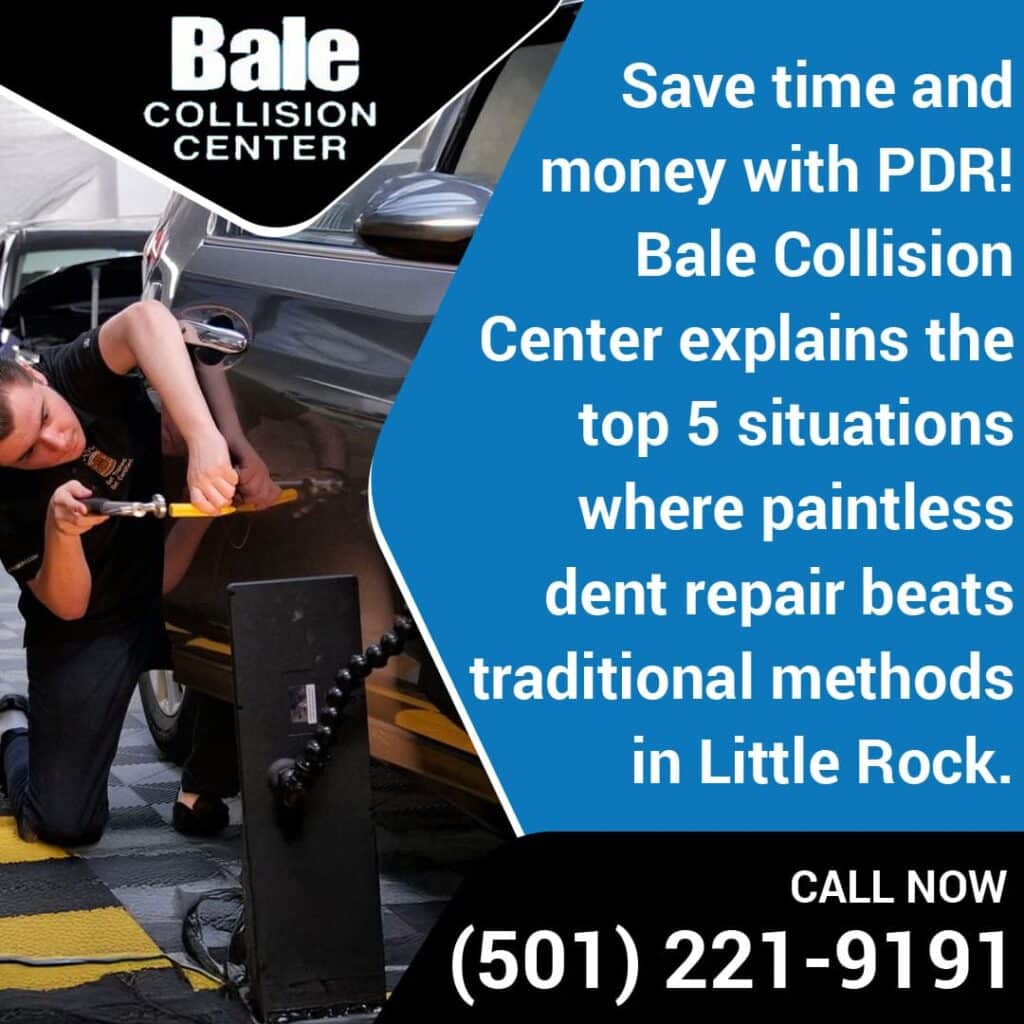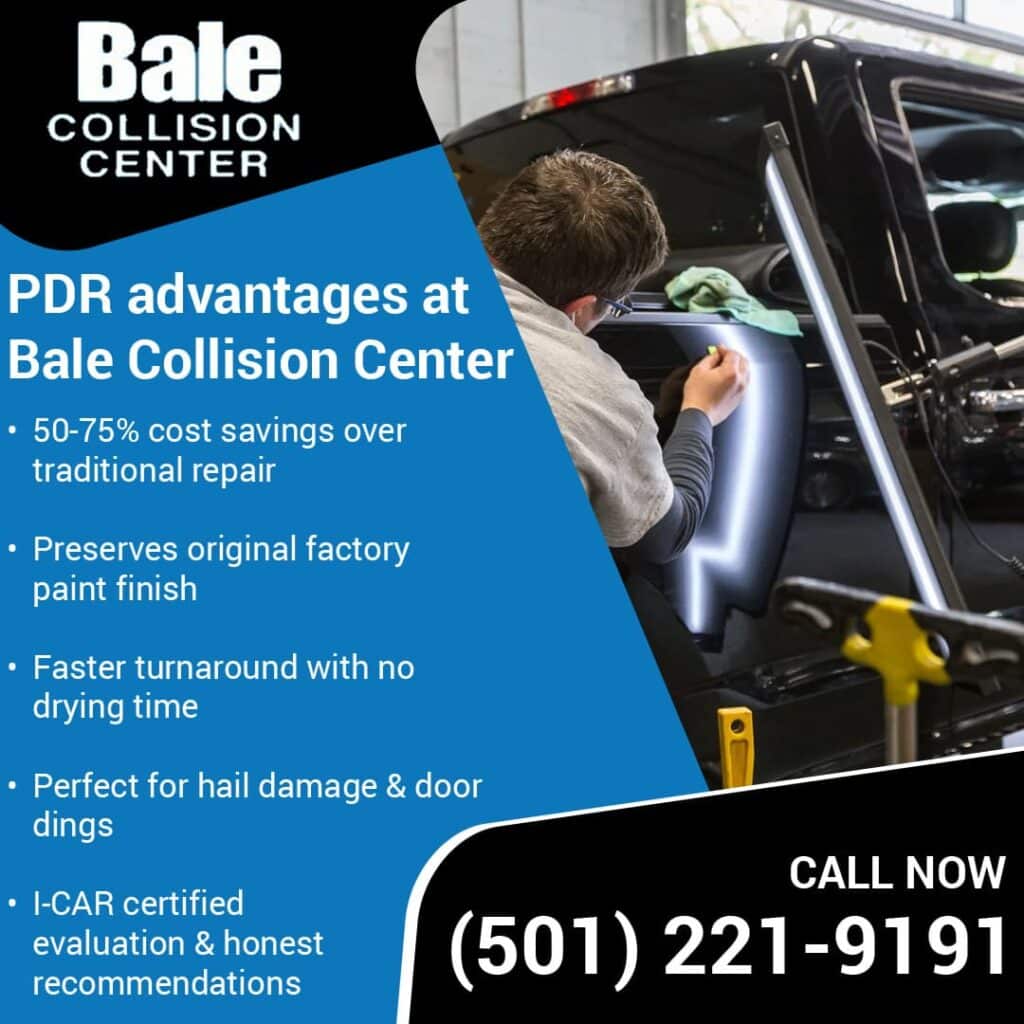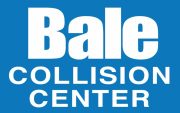Vehicle owners face a choice when dealing with dents and dings: paintless dent repair (PDR) or traditional bodywork methods. The key difference lies in the damage assessment and repair approach. Professional evaluation determines which approach delivers ideal results for your specific situation. At Bale Collision Center (Chenal), we help customers understand when PDR offers significant advantages for specific types of damage, including cost savings, faster completion times, and preservation of your vehicle’s original factory finish. Our paintless dent repair in Chenal Parkway, Little Rock, AR, provides superior results for qualifying damage while protecting both your vehicle’s value and your budget.

When Your Vehicle Has Suffered Hail Damage
Hail damage represents the perfect scenario for paintless dent repair. Arkansas experiences frequent hailstorms that create multiple small to medium-sized dents across vehicle surfaces. These impacts typically don’t crack paint but leave numerous dents requiring professional attention.
Why PDR Excels for Hail Damage
Hailstones create round or oval-shaped dents that respond exceptionally well to PDR techniques. The impact pattern spreads force across the metal surface without creating sharp creases or paint damage. Professional PDR technicians can address dozens of hail dents efficiently, often completing repairs within days rather than the weeks required for traditional methods. Insurance companies prefer PDR for hail damage because repair costs remain lower than conventional approaches.
Hail Damage Assessment Factors
The size and depth of hail dents determine PDR suitability. Dents ranging from pea-sized impacts to larger golf ball-sized damage often qualify for paintless repair. Our certified technicians at Bale Collision Center evaluate each case individually, considering dent distribution, panel accessibility, and paint condition.
Location of the dent matters for hail damage repair. Dents on flat panels like hoods, roofs, and doors provide easier access for PDR tools. Areas near body lines or reinforcement structures may require modified techniques or alternative repair approaches.
For Door Dings and Parking Lot Damage
Shopping cart impacts and door dings create ideal conditions for paintless dent repair. These common occurrences produce shallow, round dents without paint scratches or chips. The damage usually affects accessible panels where PDR techniques work most effectively.
Typical Parking Lot Scenarios
Door dings from adjacent vehicles create small, contained damage areas perfect for PDR. The impact force spreads across a limited area, creating metal displacement without stretching or tearing. These repairs often take under an hour and cost much less than traditional bodywork.
Traditional repair methods for similar damage require sanding, body filler application, primer coating, and paint matching. These additional steps increase both material costs and labor time, resulting in repair bills often 3-4 times higher than PDR alternatives.
Shopping cart damage follows similar patterns, producing dents that respond well to professional PDR techniques. The rounded edges of cart impacts rarely create sharp creases that complicate repair procedures.
When You Need to Preserve Your Vehicle’s Original Paint
Original equipment manufacturer (OEM) paint systems offer superior durability, color consistency, and resale value compared to aftermarket refinishing. PDR preserves these benefits by avoiding paint removal or reapplication.
Factory Paint Value Preservation
Vehicle manufacturers apply paint using specialized processes and equipment not available in typical body shops. The multi-coat system includes specific primers, base coats, and clear coats designed for proper adhesion and longevity. PDR maintains these factory advantages while traditional repairs risk color-matching issues and texture variations.
Color matching challenges frequently occur with traditional repairs, especially on metallic or pearl finishes. Environmental factors like sun exposure create subtle color variations that complicate exact matching. PDR eliminates these concerns by maintaining original paint throughout the repair process.
Impact on Vehicle History Reports
Professional PDR repairs often avoid appearing on vehicle history reports like Carfax or AutoCheck. Since no structural modifications or paint work occur, the repair may not require disclosure in vehicle information reports. This transparency benefits future resale or trade-in valuations.
At Bale Collision Center, we work directly with insurance companies to properly document repairs while maintaining accurate vehicle history records. Our I-CAR Gold Class certification and transparent processes protect your vehicle’s documented history.
For Time-Sensitive Repair Situations
PDR delivers faster turnaround times for qualifying damage. Traditional dent repair requires multiple steps with drying and curing periods between processes. Paint application alone requires specific environmental conditions and extended drying times before vehicle return. PDR eliminates these delays by working directly with existing metal and paint surfaces.
The elimination of paint work removes weather dependency and environmental restrictions that affect traditional repairs. PDR technicians can work in various conditions without concerns about humidity, temperature, or dust contamination affecting paint application.
Insurance and Rental Car Benefits
Faster PDR completion reduces rental car expenses for insurance claims. Extended repair periods increase total claim costs through additional rental fees. Insurance companies recognize these savings and often recommend PDR for qualifying damage.
We work with major insurance providers, including State Farm, Allstate, Liberty Mutual, Hanover, USAA, Nationwide, Safeco, and AAA, to streamline the claims process. Our established relationships facilitate faster approval and completion for paintless dent repair services.
When Cost-Effectiveness Is a Priority
PDR typically costs 50-75% less than traditional repair methods. The simplified process eliminates expensive materials like body filler, primer, paint, and clear coat. PDR uses only specialized tools and technician expertise, avoiding these material costs entirely.
Labor efficiency improvements provide additional savings. Skilled PDR technicians complete repairs faster than traditional multi-step processes requiring different specialists for metalwork, painting, and finishing operations.
Long-term Value Protection
Professional PDR maintains vehicle value better than traditional dent repairs through original paint preservation and proper metal restoration. Choosing the best PDR shop near you ensures this value protection through proper technique and quality workmanship. The factory finish carries more credibility with potential buyers than aftermarket paint jobs, regardless of quality-matching attempts..
Professional Assessment Makes the Difference
Expert evaluation determines the most appropriate repair approach for your specific situation. Our certified technicians at Bale Collision Center combine decades of experience with advanced diagnostic techniques to assess damage accurately.
I-CAR Certification Standards
I-CAR certification represents the highest level of professional training in the collision repair industry. This certification requires continuous education and testing to stay current with evolving repair techniques and vehicle technologies. Our technicians maintain I-CAR Platinum certification, and our shop has I-CAR Gold Class certification.
I-CAR Gold Class certification demonstrates our commitment to proper repair procedures and ongoing training. These credentials establish us as the best PDR shop near you, assuring that damage assessment and repair recommendations follow industry best practices.
Advanced Evaluation Techniques
Professional damage assessment uses specialized lighting and measurement tools to identify all affected areas. Reflective analysis techniques reveal subtle damage patterns not visible under normal lighting conditions. Our technicians evaluate metal flexibility, paint condition, and access requirements before recommending dent repair approaches. This thorough assessment prevents inappropriate repair attempts.
Bale Collision Center for PDR in Chenal Parkway, Little Rock, AR
Our dual repair approach sets us apart from single-method shops. Unlike facilities that specialize only in PDR or traditional bodywork, Bale Collision Center offers both services under one roof. This comprehensive capability means we can honestly assess your damage and recommend the most appropriate repair method without bias toward a single technique.
Transparent Assessment Process
Many shops push customers toward their preferred repair method regardless of damage suitability. Our technicians evaluate each case objectively, considering factors like dent location, metal condition, paint integrity, and your specific timeline needs. We explain why PDR works for your situation or recommend alternatives when traditional methods provide better results.
This honest approach builds trust because customers know our recommendations serve their best interests rather than our convenience. We’ve built our 72-year reputation on this integrity, and it continues to differentiate us from competitors who may oversell services.
Advanced PDR Tools
Our PDR department features specialized equipment. Professional-grade LED lighting systems reveal damage details invisible under standard workshop conditions. Precision measurement tools help our technicians map dent patterns accurately before beginning repairs.
We invest in ongoing tool upgrades because PDR technology continues advancing. New vehicles use different metal alloys and panel designs that require updated techniques and equipment. Our commitment to staying current ensures we can handle the latest vehicle models effectively.
Seamless Insurance Integration
Rather than simply working with insurance companies, we’ve developed streamlined processes that minimize customer involvement in claims paperwork. Our estimators use professional estimation software that integrates seamlessly with major insurer systems, reducing approval delays and revision requests.
This integration extends to our documentation practices. We provide detailed photo records and repair summaries that satisfy insurance requirements while giving customers a clear understanding of the work performed. Many shops treat insurance as an afterthought, but we’ve made it central to our customer service approach.

PDR or Traditional Dent Repair: Making an Informed Decision
The decision between PDR and traditional repair methods depends on specific damage characteristics and individual priorities. Professional evaluation provides the information needed to make informed choices that balance cost, time, and quality considerations.
Vehicle age, condition, and intended use influence repair method selection. Newer vehicles with minor damage typically benefit most from PDR approaches that preserve original finishes and maintain resale values.
Budget constraints and time requirements also affect decision-making. PDR offers superior value for qualifying damage, while traditional methods provide solutions for more extensive repairs requiring paint work or structural restoration.
Contact Us for Expert Dent Repair Guidance
Don’t let misconceptions or incomplete information prevent you from considering the most appropriate repair approach for your vehicle. Contact Bale Collision Center today at (501) 221-9191 or email bccwlr@baleautomotive.com for a professional evaluation. Our certified technicians will assess your damage and recommend the most effective repair approach for your specific situation. Whether you need paintless dent repair in Chenal Parkway, Little Rock, AR, or a traditional method, we provide quality results backed by decades of experience and professional certification.
Let our expertise guide your repair decisions and restore your vehicle to its original condition efficiently and affordably. Schedule your free estimate today and discover why customers consider us the best PDR shop near you.
